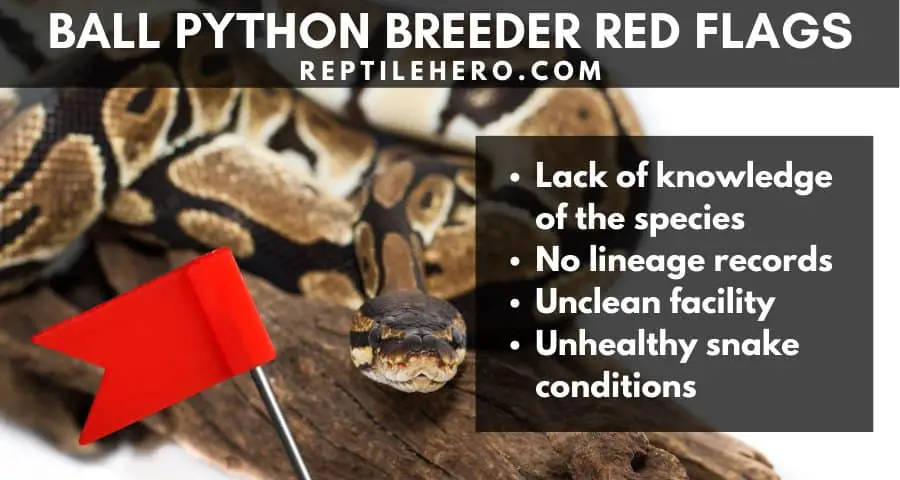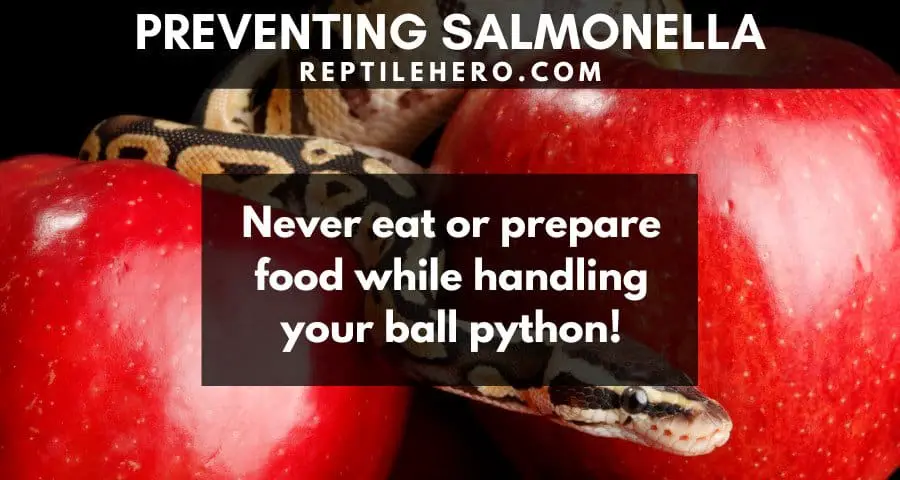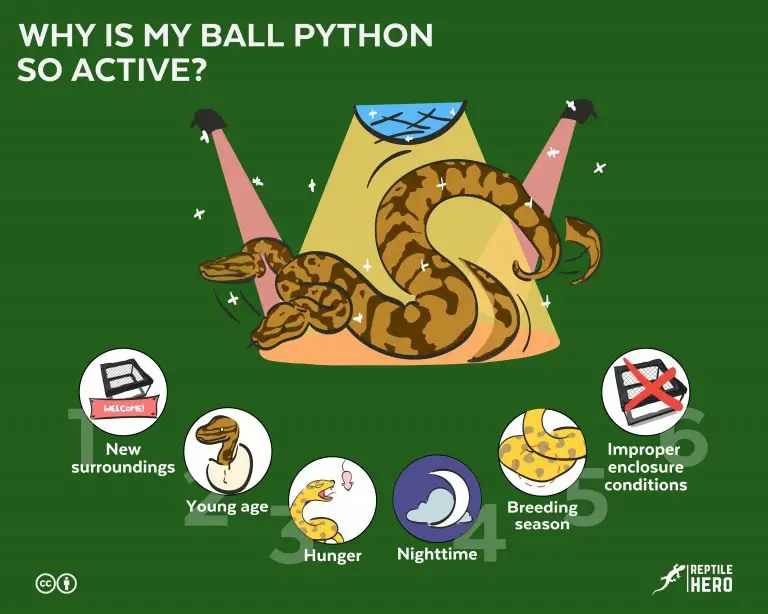Can Ball Pythons Have Salmonella?
Have you ever heard that reptiles have salmonella? Is it really true and are ball pythons one of the most common carriers of salmonella? When taking care of our pets, they should be the priority but there are times when we might also be at risk.
Ball pythons have a high chance of carrying salmonella. As such, they can cause salmonellosis in humans through direct contact. However, with proper hygiene and safety precautions during keeping and handling, owners have a low chance of getting sick from salmonella.
Ball pythons are naturally clean and don’t smell bad except for their poop. But why do they have salmonella? What can you do for your ball python and for yourself to avoid this bacteria? Learn everything you need to know about these as you read until the end!
How Do You Know if a Ball Python Has Salmonella?
Unfortunately, there are no physical indications of whether a ball python has salmonella or not. But stool samples collected and tested by an exotic or reptile veterinarian can indicate the presence of salmonella in the python.
Rest assured, however, that even if your ball python has salmonella in their digestive tract, it will be perfectly safe!
Ball pythons cannot die from salmonella due to their immunity to the bacteria.
You, on the other hand, have the shorter end of the stick in such situations.
More often than not, owners only realize and find out that they got salmonella from their ball python once they start showing symptoms of salmonellosis like diarrhea.
What is Salmonella?
Salmonella is a bacteria that is commonly found in the digestive tract of animals and humans. Salmonellosis is an infectious disease caused by salmonella.
Salmonella can be transmitted to you when you accidentally eat food contaminated by this bacteria.
Even common household pets like cats and dogs can also carry salmonella, so the stigma that only reptiles are carriers is not true.
What not many people seem to realize though is that the most common cause of salmonellosis is improperly handled food [1]. So don’t go preparing yourself a sandwich right after handling and petting your pet.
The symptoms of salmonellosis include:
- Stomach cramps
- Diarrhea
- Headache
- Fever.
Depending on the severity of the infection, the effects and intensity of these symptoms will vary.
Some experience only a few symptoms like diarrhea. But others diagnosed with salmonellosis suffer more intense effects that require hospitalization. There are even fatalities recorded!
Can You Prevent Your Ball Python From Getting Salmonella?
There is no way to ensure that a ball python will not get and carry salmonella in their digestive tract. They can acquire these bacteria from their mother, food, and their overall environment.
Even though you can prevent salmonella transmission to yourself, you cannot do it for your ball python. But this does not mean that you can slack off in taking care of your scaly friend!
You can minimize the risk of your ball python getting salmonella with regular spot cleaning in its enclosure and by making sure to only buy healthy feeders.
I also recommend checking the breeding facility of the seller or breeder you will be purchasing the snake from. By seeing their living conditions before they arrive to you, you can gauge how likely it is for ball pythons to be silently carrying harmful bacteria.

But as said in the previous section, this bacteria is harmless to them so you can just worry for your own safety!
How Can You Get Salmonella From Your Ball Python?
Humans can acquire salmonella from a ball python from contact with its feces. It can be transmitted directly from the excrement, body, substrate, and water of the python.
When you touch a ball python with salmonella on its body, you can then transfer the bacteria to your food which can cause salmonellosis.
Take note, you will only get salmonellosis when you’ve ingested the salmonella bacteria. But so far, I have not heard of any friends and acquaintances in the reptile-keeping community getting salmonella from their ball python.
Now, you may also be wondering how can you still have salmonella even without touching its feces if salmonella only comes from a ball python’s poop.
See, here’s the thing, ball pythons can sometimes slither over their poop which can spread the bacteria all over their body. Their substrate and water can also contain this bacteria so always wash your hands after cleaning the enclosure of your scaly pet [2].
Safety Precautions to Prevent Salmonellosis
To prevent salmonellosis from ball pythons it is recommended to:
- Always wash hands before and after handling ball pythons
- Do not kiss or lick a ball python
- Do not eat during python handling
- The python should be kept away from food preparation areas
- Do not wash a python’s water dishes and hide in the kitchen sink
- Do not let children under 5, elderly, and sick persons handle a ball python
- Change clothing after handling a ball python
As long as you follow these safety precautions, the risk of contracting salmonella from your ball python will almost become impossible.

There are no vaccines to prevent salmonellosis so the only options are proper hygiene and the precautions listed above.
What Other Reptiles Can You Get Salmonella From?
In general, all reptiles can carry and get salmonella bacteria in their digestive tract. The most common reptiles that have a high risk of having salmonella are turtles, tortoises, monitor lizards, and snakes.
Even though all reptiles can get salmonella, preventing salmonellosis for yourself is very easy—as I’ve explained in the last section.
It is estimated that only 10% of people diagnosed with salmonellosis get the illness from reptiles.
If you own another pet like a reptile, another useful tip is to refrain from bathing your pet in the kitchen sink or the place where you wash dishes and prepare food [4].
Can You Infect Your Ball Python?
It is almost impossible for ball pythons to contract diseases from humans. However, some reptile-specific illnesses can be transferred to pythons through humans.
Even though some keepers theorized that a ball python can get sick from humans, there are no scientific studies or evidence to prove it to be true.
However, we can transfer bacteria to our ball python that came from other reptiles like a respiratory infection. This is the reason why we should also wash our hands before handling our beloved snake!
Because imagine that you went to a pet store and you did not even touch a single reptile, however, some surfaces on the store might have snake mites or harmful bacteria.
Then you come home and immediately touched your ball python, and you might wonder why there has been a mite infestation or respiratory issues.
What Parasites Can Ball Pythons Get?
Ball pythons can have ectoparasites like snake mites and endoparasites like ringworms. Ectoparasites are visible from the body of the snake while endoparasites will leech inside of the python.
Snake mites, they are often easily seen embedded into the ball python’s scales and you can sometimes find your snake rubbing its seemingly itchy body.
In contrast, ball pythons suffering due to endoparasites commonly exhibit symptoms such as bloody or smelly stools and refusal to eat.
>>Learn more about weird ball python smells in our article do ball pythons smell bad?
The presence of such parasites can be confirmed by sending a stool sample to your vet.
Common endoparasites in ball pythons are Ascarids, Capillaria, and Amblyomma [5].
Further Questions
Can a ball python get salmonella from cats?
It is unlikely for a ball python to get salmonella from cats. Cats and dogs have a lower chance of getting salmonella in comparison to reptiles like ball pythons.
Are there other diseases humans can get from reptiles?
Leptospirosis can be contracted from the urine of an infected reptile. Another infectious disease humans can contract from reptiles is botulism which is common in burrowing species and has a high chance of infection for infants 1 year old and below.
Summary of Do Ball Pythons Have Salmonella
Ball pythons have a high chance of having salmonella bacteria in their digestive tracts. There are no physical symptoms to determine whether a python has salmonella or not. But stool testing can be done to confirm the presence of the bacteria in the snake’s feces.
In most cases, ball pythons that are in a clean environment and have healthy prey have a lower chance of getting salmonella bacteria. Ingesting the bacteria found in the snake’s stool is the primary source of transmission of salmonella from a ball python.
To prevent salmonella infection or salmonellosis, washing hands before and after handling a ball python is a must. Children under 5 and the elderly are also prohibited from handling reptiles. Lastly, the snake itself or any provisions like substrate and water dish should be handled far away from the kitchen or any food-preparation area.
Sources
[1] https://www.mass.gov/doc/salmonella-0/download
[2] https://www.cdc.gov/mmwr/volumes/67/wr/mm6719a7.htm
[3] https://vetmed.illinois.edu/mmitch/pdf/salmonella.pdf
[4] https://www.cfsph.iastate.edu/Factsheets/pdfs/reptile_associated_salmonellosis.pdf
[5] https://www.researchgate.net/publication/51176216_Parasites_in_pet_reptiles






